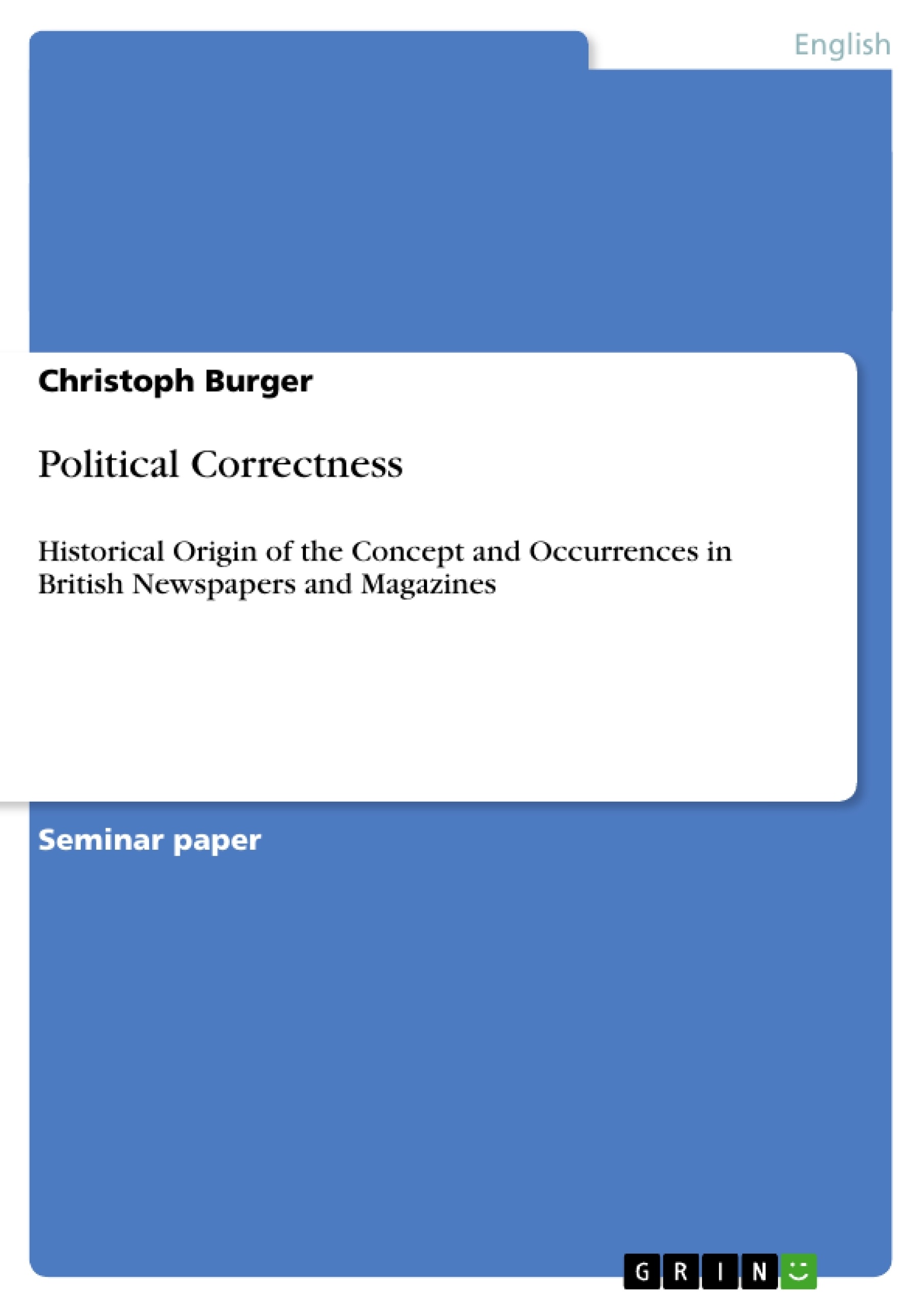In this paper I will discuss the concept and the historical origin of political correctness in America and how it managed its way to Great Britain. The discussion will be followed by a section, describing my own research. The main purpose of this investigation is to determine if "political correctness" exists in Great Britain and if there are differences between newspapers and magazines.
In 1990 and 1991 the political correctness debates started in the USA. These debates received great attention in the media as a series of articles in Newsweek, U.S. News and World Report, the New York Times, Time, the Village Voice, and Atlantic Monthly was written. It was also featured in numerous magazine covers and nationwide talk shows on TV. (c.f. Calhoun 2001: 1337). Due to this great popularity it has been a "'household word' in Anglophone North America since the early 1990" (Auer 2004: 3). Nonetheless it is very hard to define.
The terms "politically correct" and "political correctness" came from the Left movement, where it was used ironically to describe people who were too orthodox. Now it is often used by the Right to describe the Left. Its meaning has also been blurred by the mass media. The stems of the concept are most likely situated in the social movement culture of the late sixties. Important movements are "The American Civil Rights movement", "The Women's Liberation" and "The Gay and Lesbian Liberation". Political correctness came to Great Britain shortly after it boomed in the US. Its development was similar, but on a much lower scale.
My own research showed that there were more occurrences of words with a –man suffix in newspapers than in magazines. The most surprising fact was, that there was not even one word with the suffix –person. I had to restrict research area to the suffixes of –man, –woman and –person, otherwise it would have gone beyond the scope of my paper.
Keywords: political correctness, politische Korrektheit, Diskriminierung, Vorurteile,
Inhaltsverzeichnis (Table of Contents)
- 1. INTRODUCTION
- 2. 'POLITICAL CORRECTNESS' AND 'POLITICALLY CORRECT' AS TERMS
- 2.1 DEFINITIONS OF POLITICAL CORRECTNESS (P.C.)
- 2.2 ORIGINS, USAGE AND MEANING OF THE PHRASES THROUGHOUT THEIR HISTORY
- 3. PC AS AN IDEA: SOCIO-HISTORICAL SETTING AND CONCEPTS
- 3.1 THE AMERICAN CIVIL RIGHTS MOVEMENT
- 3.2 IDENTITY POLITICS
- 3.3 THE WOMEN'S LIBERATION MOVEMENT
- 3.4 GAY AND LESBIAN LIBERATION
- 3.5 STRUGGLES AGAINST THE DISCRIMINATION ON GROUNDS OF AGE AND DISABILITY
- 4 THE BEGINNING OF THE P.C. DEBATE IN GREAT BRITAIN
- 5. RESEARCH PART
- 5.1 SOURCES AND METHOD
- 5.2 FINDINGS
- 5.2.1 Newspapers
- 5.2.2 Magazines
- 6. CONCLUSION
Zielsetzung und Themenschwerpunkte (Objectives and Key Themes)
This paper examines the concept of political correctness, tracing its historical origins in America and its subsequent adoption in Great Britain. The research aims to determine the existence and nature of "political correctness" in Britain, analyzing any differences in its manifestation between newspapers and magazines.
- Historical development of the terms "political correctness" and "politically correct."
- The socio-historical context of political correctness, including its relationship to various social movements.
- The definition and usage of political correctness in different contexts.
- The emergence and evolution of the political correctness debate in Great Britain.
- Analysis of the presence and application of political correctness in British newspapers and magazines.
Zusammenfassung der Kapitel (Chapter Summaries)
Chapter 1: Introduction provides an overview of the paper's scope and objectives.
Chapter 2: 'Political Correctness' and 'Politically Correct' as Terms defines the terms and examines their historical development and evolving meaning, noting the difficulty in establishing a universally accepted definition and highlighting the shift in usage from its origins within leftist and activist circles to wider public discourse.
Chapter 3: PC as an Idea: Socio-Historical Setting and Concepts explores the connections between political correctness and various social movements in the USA, focusing on the American Civil Rights movement and the evolution of language used to refer to African Americans.
Schlüsselwörter (Keywords)
Political correctness, politically correct, social movements, American Civil Rights Movement, identity politics, British newspapers, British magazines, language, discourse, media, debate.
- Quote paper
- Christoph Burger (Author), 2005, Political Correctness, Munich, GRIN Verlag, https://www.grin.com/document/119578




